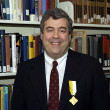Finding God’s Dice

When most people think of Albert Einstein’s contribution to physics, the theory of relativity is what comes to mind, and rightly so. What most don’t realize is that his Nobel Prize was actually awarded for explaining the photoelectric effect, a result which contradicted the classical understanding of light and helped lead to the development of Quantum Mechanics. Despite his major contributions to its development, Einstein was famously uncomfortable with the way randomness and uncertainty... Read More
From Faith Came Science: The Condemnations of 1277
by Dr. Stacy Trasancos
Filed under Christianity and Science

In 1277, Étienne Tempier, the Bishop of Paris, issued a list of 219 condemned propositions relating to details of Aristotelian texts that were irreconcilable with the Christian worldview. These propositions were not binding on Christians, but served as a guide for the scholars at the University of Paris. The decree largely dealt with the eternity of the world and creation. The Condemned Propositions The propositions are often referenced by historians of science, and their intent... Read More
Modern Physics, Ancient Faith: An Interview with Physicist Dr. Stephen Barr
by Brandon Vogt
Filed under Christianity and Science

Some news hooks are irresistible, even when they're false or at least incomplete. Case in point: the alleged conflict between science and religion. Is science opposed to religion? The answer depends in large measure on what you mean by religion. If your "religion" is, say, astrology, then you could say there's a conflict between science and "religion". The science of astronomy does conflict with the "religion" of astrology. Probably most people who speak of a conflict between science and... Read More






